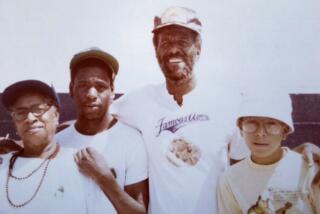Robert C. Wian, Founder of Bob’s Big Boy, Dies at 77
- Share via
NEWPORT BEACH — Robert C. Wian, the founder of the Bob’s Big Boy restaurant chain known internationally for its double-deck hamburgers and chubby boy mascot in red-and-white checkered overalls, died Tuesday. He was 77.
Wian, who opened his first restaurant in Glendale in 1936 with $350 he made by selling his car, died at Hoag Memorial Hospital in Newport Beach of complications from a cerebral hemorrhage, which he had suffered in March.
“Bob was a giant in the restaurant industry,” said William H. Morgan, senior executive vice president of Elias Bros. Restaurants Inc., which owns the franchise rights to the chain. “His restaurants will always be a part of Americana.”
The native Philadelphian nurtured a 10-stool hamburger joint called Bob’s Pantry in Glendale into a 1,000-outlet worldwide franchise that is one of the most recognizable and successful family restaurant chains.
Wian also blazed a trail in employee relations and was among the first restaurant owners to give employees profit-sharing and health insurance plans. Wian in 1967 sold his interest in the chain to the Marriott Corp., which later sold it to Elias Bros.
In addition to the restaurant business, Wian was elected to the Glendale City Council in 1948 and was later mayor.
The source of his fame, however, remained his inventiveness in the food-service business. A few years after opening Bob’s Pantry, Wian changed the name to Bob’s Big Boy and converted it into a drive-in restaurant, offering dime hamburgers, french fries and shakes “so thick you can eat them with a spoon,” the restaurant said.
But it was his double-deck hamburgers packaged in sesame seed buns that drew the most rave reviews from customers.
Wian said the idea for the double burger actually started as “a joke” when he slapped it together for a friend who asked for a different kind of hamburger.
“The whole idea just took off,” Wian told a Times reporter several years ago.
Another thing that made his burgers special was the quality of the meat. “In those days, people were skeptical of hamburger meat,” he said, “so we ground it ourselves” in front of the customers.
Even more famous than the double-deck burger, however, was the fat little boy with the bright red-and-white overalls. It was a trademark that Wian fashioned after a young customer at the original Colorado Boulevard restaurant, Rick Woodruff.
Woodruff would take a stool at the counter and stay for more than one hamburger. “His grandmother would have to drag him out of the place,” said Casey Wian, 31, Wian’s son.
One of his father’s friends was there one day and drew a sketch of the boy on a napkin, he said, and “the rest is history,”
Over the years, the Big Boy character evolved. “The first (rendering) had him holding a hamburger with a bite out of it and his cheeks full of food, and he was barefoot,” he recalled.
In the 1950s, Wian’s restaurants grew in popularity and were franchised throughout Southern California. Some became so popular they were “hangouts for high school students,” Wian said, so his father hired security guards to handle the crowd and cars, which would line up for blocks.
Much of Wian’s success, friends and family said, came from his concern for his employees and his innovative spirit.
Longtime former employee Ray Rodusky, 52, said he earned more than $200,000 in profit-sharing while flipping burgers for Wian for more than 20 years.
“Bob Wian really cared about us,” the Garden Grove resident said. “He treated everyone like they were family.”
Along with being credited with inventing the double-deck hamburger, Wian is recognized as being the first to introduce customers to sesame seed buns and coarse-ground pepper.
In another industry first, Wian cast his corpulent Big Boy character in a comic book handed to children at the table, which added to the chain’s popularity as a family spot to eat.
After opening 22 Big Boy restaurants and franchising hundreds of others, Wian sold the business to Marriott Corp. for $7 million, though he remained involved in some aspects of the chain’s operations until the mid-1970s.
In recent years, the Big Boy’s presence in Southern California has faded. Marriott, which sold the franchise rights to Elias Bros. in 1988, has been converting many of its Bob’s restaurants it owns into other, more modern eateries.
Morgan said Elias Bros. plans to open new Big Boy restaurants in California.
Wian retired from the restaurant business in the 1970s and moved his family to an 800-acre ranch in Valyermo, about 30 miles southeast of Palmdale. He was an avid hunter, rancher and yachtsman.
Seven years ago, Wian and his wife, June, moved to Newport Beach, where he spent time at the Newport Beach Country Club playing cards and backgammon with friends.
On March 9, Wian was found unconscious by his wife in their Big Canyon home. He had suffered a brain hemorrhage that left him partly paralyzed.
He is survived by his widow; his sisters, Doris Weis and Katharine Kurvink; daughters, Barbara Baehler and Julie Wian; sons, Chapman Baehler and Casey Wian, and three grandchildren.
Funeral services will be at 11 a.m. Thursday at Pacific View Memorial Park in Newport Beach. The family has requested that in lieu of flowers donations be sent to the Hoag Hospital Foundation General Fund.
More to Read
Eat your way across L.A.
Get our weekly Tasting Notes newsletter for reviews, news and more.
You may occasionally receive promotional content from the Los Angeles Times.










